Gun-violence echoes across the Dangerland of the West!
Perhaps the first thing to state is that this isn’t a typical Flynn film, at least not the Flynn most viewers will know. This is the Flynn of the 1950s, a decade he would not live to see the end of. His looks and panache are still relatively intact, but the toll of his lifestyle is readily apparent to those more familiar with his earlier work. The panache never completely faded, but the looks definitely took on a dramatically haggard and bloated look as the decade continued. The overall quality of his films, both on overall quality and his own performance declined precipitously as well as the 1950s progressed.
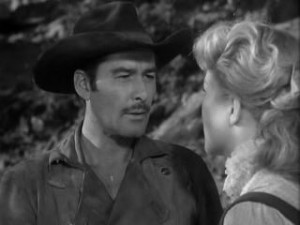 Unlike late 1950s films, Flynn is still the lead in name and deed. (Unlike his last pictures, where his name still came above the title even for bit parts like in Too Much, Too Soon, and The Roots of Heaven.) However, he isn’t the romantic love interest here who every lass falls head over heels for. Rather, this is a more subdued and perhaps even more compelling Flynn in what could have been a much more dynamic role.
Unlike late 1950s films, Flynn is still the lead in name and deed. (Unlike his last pictures, where his name still came above the title even for bit parts like in Too Much, Too Soon, and The Roots of Heaven.) However, he isn’t the romantic love interest here who every lass falls head over heels for. Rather, this is a more subdued and perhaps even more compelling Flynn in what could have been a much more dynamic role.
Joining us is veteran Flynn director William Keighley, whose previous Flynn films include The Prince and the Pauper and The Adventures of Robin Hood from Flynn’s glory days. After this, Keighley would return for his final directorial effort for Errol Flynn’s final swashbuckler, 1953’s The Master of Ballantrae.
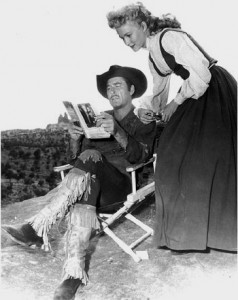 William Keighley must have been a welcome sight for our mature leading man, as balance of the cast would have been fairly new to Errol Flynn. Among the new faces was a much younger woman, Patrice Wymore, who plays the female lead. Ultimately Ms. Wymore would become the final Mrs. Errol Flynn in what would become an ultimately extremely stressful marriage as her star husband’s star and health declined further. As of this writing, Ms. Wymore is still alive and active in the affairs of Errol Flynn’s estate and various remembrances of him.
William Keighley must have been a welcome sight for our mature leading man, as balance of the cast would have been fairly new to Errol Flynn. Among the new faces was a much younger woman, Patrice Wymore, who plays the female lead. Ultimately Ms. Wymore would become the final Mrs. Errol Flynn in what would become an ultimately extremely stressful marriage as her star husband’s star and health declined further. As of this writing, Ms. Wymore is still alive and active in the affairs of Errol Flynn’s estate and various remembrances of him.
But on to the show. The names of the characters are of no matter. Errol Flynn is a Confederate Captain sent to California in command of a small band to meet with a local gang leader in openly supporting the Confederacy. General Lee feels this effort, if successful, could turn California into a hotbed of Confederate sympathy and the resulting drawdown in Union forces in the east would enable Lee to be militarily triumphant. A long shot to be sure.
This Civil War piece of the plot in my mind never really goes anywhere but merely serves to set the stage. Against orders (which were to keep a low profile), Errol Flynn leads his band on the attack in defense of a stagecoach being attacked by a band of Indians. (Please no comments, as I say Indians because that is the nomenclature of the time period- both in history and at the film’s release.)
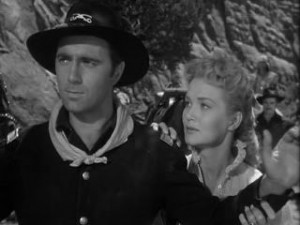 Being successful, they discover a young and terrified Patrice Wymore in the overturned stage. Patrice Wymore is engaged to a Union officer (Scott Forbes) who as a result begins a search for her, which is, to say the least, somewhat problematic if you are a Confederate. The still marauding Indians are also still after Flynn’s battered band as well.
Being successful, they discover a young and terrified Patrice Wymore in the overturned stage. Patrice Wymore is engaged to a Union officer (Scott Forbes) who as a result begins a search for her, which is, to say the least, somewhat problematic if you are a Confederate. The still marauding Indians are also still after Flynn’s battered band as well.
Ultimately, Errol Flynn captures Scott Forbes, who subsequently escapes. At the climax of the film the Confederate band diverts the pursuing Indian band (now hot on their heels) in an effort to save “the girl.” Being chased by the Indians, the Confederates ultimately end up in a blind canyon…..
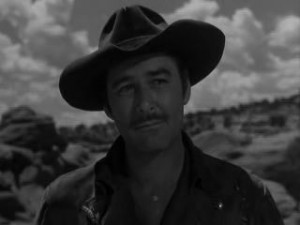 This is truly not a bad picture. It is not only well made , well filmed (without being “Fordian”), and most all the characters are quite completely fleshed out. Errol Flynn as well does an outstanding job. And I say that not from the standpoint of Flynn as the dynamic swashbuckler he is remembered as, but as the somewhat more dynamic actor he could have become. A bit more strength in the actors playing the role ultimately taken by Patrice Wymore and Scott Forbes would have been immensely helpful and would help this film be held in higher regard today. Unfortunately in 1950, Errol Flynn was at the verge of being a has been.
This is truly not a bad picture. It is not only well made , well filmed (without being “Fordian”), and most all the characters are quite completely fleshed out. Errol Flynn as well does an outstanding job. And I say that not from the standpoint of Flynn as the dynamic swashbuckler he is remembered as, but as the somewhat more dynamic actor he could have become. A bit more strength in the actors playing the role ultimately taken by Patrice Wymore and Scott Forbes would have been immensely helpful and would help this film be held in higher regard today. Unfortunately in 1950, Errol Flynn was at the verge of being a has been.
William Keighley’s direction is crisp and the action well done, as one would expect from such a veteran director. Touching developmental scenes on Flynn’s group’s bond and togetherness are also well done without being cliched and trite.
Well done. Available as part of of WB’s Errol Flynn’s Western box set.
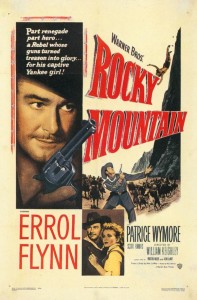
I like this film a lot. An older Flynn was a good thing methinks. He has gravitas in this I think his best movie. The beauty of the black and white cinematography is the real star however, and the pathos of the doomed brave Rebs is nicely done. Nil swashbuckle which is nice. Errol for all his faults was an interesting man. Remember he was an Aussie and we’ve never been well known for taking anything too seriously. He was a bit of a prong but aren’t we all? Anyway, he works well in this good movie.